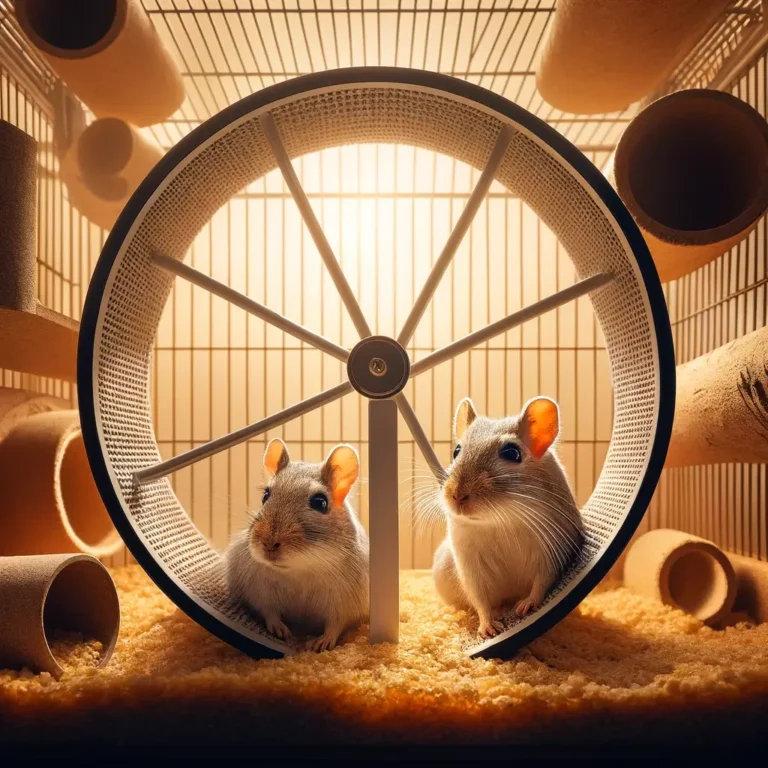Caring for a pet gerbil involves understanding their unique needs and behaviours. This guide will cover all aspects of gerbil care, including behaviour, housing, diet, health concerns, and more, ensuring that your furry friend leads a healthy and happy life.
Understanding Gerbil Behaviour
Gerbils are social, curious, and active animals that thrive in an environment that stimulates their natural behaviors. Originating from the desert, they are well-adapted to a dry environment and have a unique way of conserving water. They are also known for their digging behaviour, which means they require a deep substrate in their enclosure to satisfy this natural instinct. Keeping gerbils in pairs or small groups can prevent loneliness and promote social interaction, which is vital for their well-being.
Housing Your Gerbil
The ideal home for a gerbil is a spacious tank with a secure wire mesh lid to prevent escapes. A 20-gallon tank is suitable for a pair of gerbils, providing ample space for burrowing, exploring, and exercising. The enclosure should be placed in a quiet, temperature-controlled area of your home, away from direct sunlight and drafts. Inside the tank, include a deep layer of bedding, such as paper-based or aspen shavings, to allow for their natural digging behaviour. Avoid pine or cedar shavings, as they can be harmful to your gerbil’s respiratory system.
The Perfect Diet
Gerbils are omnivores, requiring a balanced diet of seeds, grains, vegetables, and occasional animal protein. A high-quality gerbil food mix will provide the necessary nutrients, but you can supplement this with fresh fruits and vegetables, such as apples, carrots, and leafy greens. Always provide fresh, clean water in a bottle with a metal sipper tube.
Common Health Concerns
Gerbils are generally hardy animals but can be susceptible to health issues such as dental problems, respiratory infections, and tumours. Providing chew toys can help maintain dental health, while a clean, well-ventilated environment can prevent respiratory issues. Regularly check your gerbil for signs of illness, such as lethargy, loss of appetite, or abnormal growths, and consult a veterinarian experienced with small mammals if you have any concerns.
Exercise and Entertainment
Exercise is vital for a gerbil’s physical and mental health. An exercise wheel (solid, without rungs) provides excellent physical activity, while tunnels, cardboard tubes, and safe wooden toys encourage exploration and mental stimulation. Gerbils also enjoy interacting with their human caregivers, so gentle handling and playtime outside the enclosure can be beneficial.
Grooming and Hygiene
Gerbils are naturally clean animals and take dust baths to keep their fur in good condition. Offering a shallow bowl of chinchilla dust a few times a week will help them maintain their coat. The bedding in their enclosure should be spot-cleaned daily and completely replaced every week to maintain hygiene and prevent odors.
Social Needs
Gerbils are highly social creatures and should ideally be kept in pairs or small groups of the same sex to prevent breeding. Introducing gerbils can be tricky, especially if they are adults, so it’s often best to acquire a pair that has already been established. Watching gerbils interact and play can be highly rewarding and is a significant part of the joy of keeping them as pets.
Understanding Gerbil Communication
Gerbils communicate through a variety of vocalizations, body language, and scent marking. Paying attention to these cues can help you better understand and care for your gerbil. For example, a thumping sound made with their hind legs usually indicates stress or warning.
Upkeep Costs
The initial setup for a gerbil includes purchasing a tank, bedding, food, and accessories, which can be a significant investment. Ongoing costs include food, bedding replacement, and occasional vet visits. However, compared to many other pets, gerbils are relatively inexpensive to care for.
Breeding
Breeding gerbils requires careful consideration, planning, and understanding of genetics, gestation, and the care of pups. It is not recommended for casual pet owners. If you do not wish to breed your gerbils, keeping same-sex pairs is advisable, or you will end up with a lot of gerbils!
Adoption and Purchase
When looking to bring a gerbil into your home, consider adopting from a shelter or rescue organization. If purchasing from a breeder or pet store, ensure they are reputable and that the animals are healthy and well-cared for. Spending time with your potential new pet before bringing them home can help ensure a good match.
Conclusion
Caring for a pet gerbil is a rewarding experience that requires an understanding of their unique needs. By providing a suitable habitat, a balanced diet, and appropriate care, you can ensure your gerbil leads a happy and healthy life. Remember, each gerbil has its own personality and needs, so be prepared to adapt your care as necessary. With the right approach, your gerbil will not only thrive but become a









